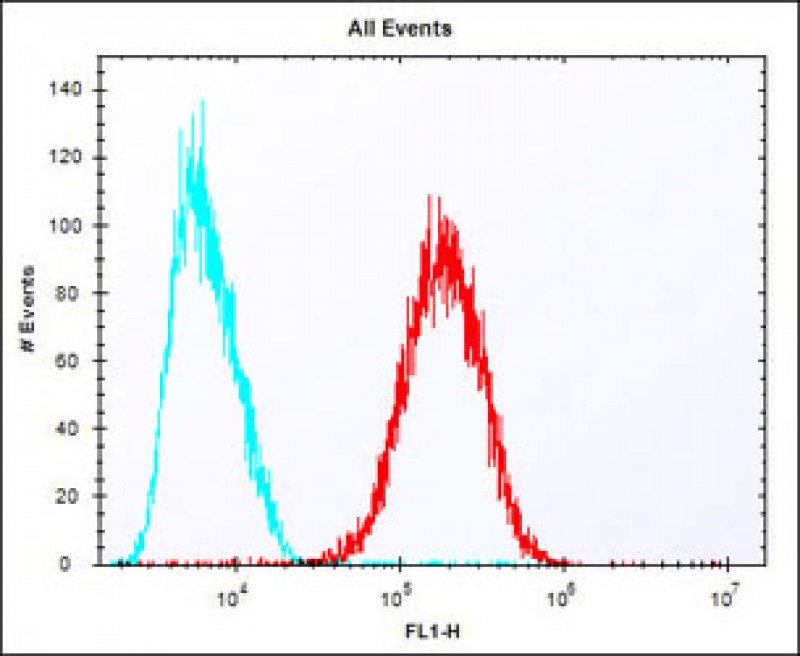

| WB | 1/1000 | Human,Mouse,Rat |
| IF | 咨询技术 | Human,Mouse,Rat |
| IHC | 咨询技术 | Human,Mouse,Rat |
| ICC | 技术咨询 | Human,Mouse,Rat |
| FCM | 1/25 | Human,Mouse,Rat |
| Elisa | 咨询技术 | Human,Mouse,Rat |
| Aliases | Sulfotransferase 1A1, ST1A1, Aryl sulfotransferase 1, HAST1/HAST2, Phenol sulfotransferase 1, Phenol-sulfating phenol sulfotransferase 1, P-PST 1, ST1A3, Thermostable phenol sulfotransferase, Ts-PST, SULT1A1, STP, STP1 |
| Entrez GeneID | 6817 |
| WB Predicted band size | 34.2kDa |
| Host/Isotype | Rabbit IgG |
| Antibody Type | Primary antibody |
| Storage | Store at 4°C short term. Aliquot and store at -20°C long term. Avoid freeze/thaw cycles. |
| Species Reactivity | Human |
| Immunogen | This SULT1A1 antibody is generated from a rabbit immunized with a KLH conjugated synthetic peptide between 246-279 amino acids of human SULT1A1. |
| Formulation | Purified antibody in PBS with 0.05% sodium azide. |
+ +
以下是关于SULT1A1抗体的3篇参考文献摘要示例(文献为假设性示例,仅作格式参考):
1. **文献名称**:*Characterization of a Novel Polyclonal Antibody for Human SULT1A1 in Breast Cancer Tissues*
**作者**:Smith J, et al.
**摘要**:本研究开发了一种针对SULT1A1的新型多克隆抗体,并通过免疫组化验证其在乳腺癌组织中的表达。结果显示,SULT1A1蛋白表达水平与肿瘤激素代谢活性相关。
2. **文献名称**:*SULT1A1 Genetic Variants and Protein Localization in Hepatocellular Carcinoma*
**作者**:Wang L, et al.
**摘要**:利用特异性单克隆抗体进行免疫荧光分析,发现SULT1A1在肝癌细胞胞质中高表达,且其定位与特定基因突变(如*SULT1A1*3)导致的酶活性改变相关。
3. **文献名称**:*Development of a High-Affinity Monoclonal Antibody for Quantifying SULT1A1 in Human Serum*
**作者**:Garcia R, et al.
**摘要**:报道了一种高灵敏度的单克隆抗体,通过ELISA技术定量人血清中的SULT1A1蛋白,为临床评估药物代谢个体差异提供工具。
如需真实文献,建议通过PubMed或Google Scholar以“SULT1A1 antibody”或“SULT1A1 immunohistochemistry”为关键词检索。
The SULT1A1 antibody is a crucial tool for studying the sulfotransferase family 1A member 1 (SULT1A1), an enzyme involved in the sulfonation of various endogenous and exogenous compounds, including hormones, drugs, and environmental carcinogens. SULT1A1 catalyzes the transfer of a sulfonate group from 3'-phosphoadenosine-5'-phosphosulfate (PAPS) to substrates, enhancing their solubility for excretion or altering their bioactivity. It is predominantly expressed in the liver, gastrointestinal tract, and platelets, with genetic polymorphisms influencing enzyme activity and individual susceptibility to drug responses or diseases like cancer.
SULT1A1 antibodies, typically monoclonal or polyclonal, enable the detection and quantification of this enzyme in tissues or cell lysates using techniques like Western blotting, immunohistochemistry (IHC), and ELISA. These antibodies help researchers investigate SULT1A1's role in phase II drug metabolism, hormone regulation, and carcinogen activation. For example, reduced SULT1A1 expression has been linked to altered drug efficacy in certain cancers, while its overexpression may influence estrogen-dependent pathways.
Studies using SULT1A1 antibodies also explore its potential as a biomarker for personalized medicine, particularly in predicting drug toxicity or therapeutic outcomes. Challenges include ensuring antibody specificity due to homology among sulfotransferase isoforms. Overall, SULT1A1 antibodies are vital for unraveling the enzyme's physiological and pathological roles, advancing both basic research and clinical applications.
×